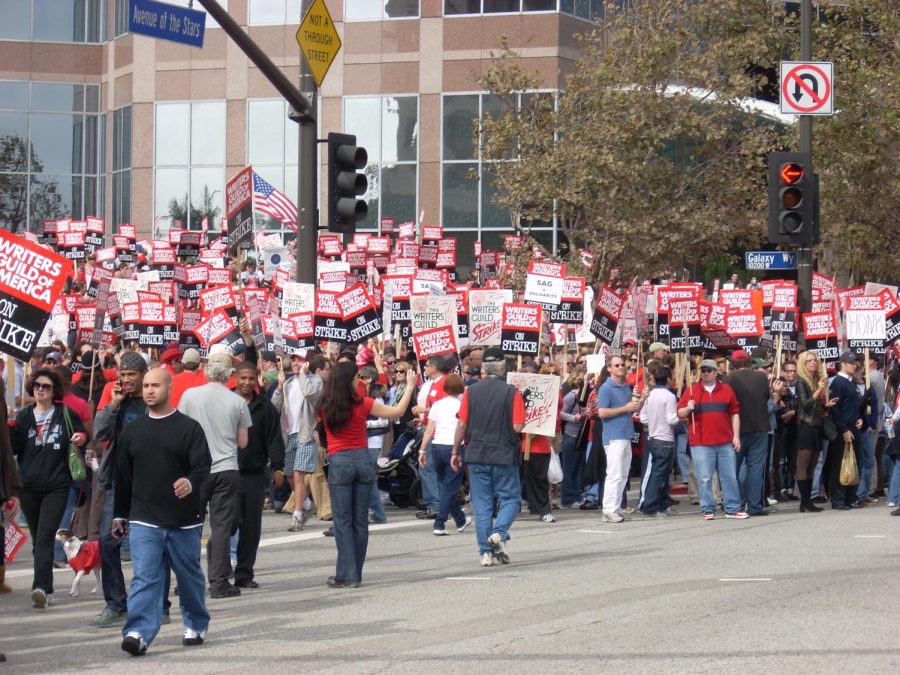Hollywood Writers Off the Job?: Writers Guild of America Strike Explained
May 19, 2023
The average American spends around 3.1 hours a day watching television. Whether we are watching a few episodes of Friends, turning on the Great British Baking Show to pass the time, or putting on an episode of Stranger Things for an adrenaline rush, we spend considerable time watching our favorite shows. Yet, we hardly ever consider what the process of making them entails. With enough research, however, you’ll find that the productions demand a tremendous amount of effort. The time and energy spent on these works–hiring the cast and crew, creating the sets, recruiting the acts, and writing the scripts (arguably the most crucial part)–is incomparably greater than the mere 3.1 hours we devote to watching them. Despite the high demand of working in the television industry, many individuals–particularly writers–have recently been unfairly compensated as a result of the rise in streaming services. So, for years, writers and others in the industry have unsuccessfully pleaded for the Alliance of Motion Picture and Television Producers (AMPTP) to pay them more equitably for their tiresome work. The Writers Guild of America (WGA), an organization that represents around 11,500 writers in Hollywood, decided to finally put an end to the chaos and fight back against the inaction with a massive strike.
The strike began on May 2 with a 97.85% approval margin from the WGA. A portion of the guild’s members will stop working until they agree with the AMPTP. This means that no member of the WGA will create any new scripts until all of the members agree to the strike’s end. As a result, many writers who already have very little income to support themselves will have to forgo their revenue from writing for the duration of the strike, which could ultimately be detrimental. Nevertheless, they went forward with the plan because the WGA’s negotiations committee deemed the AMPTP’s offers to be “wholly insufficient” and inadequate in addressing the screenwriters’ wage reduction of 14% over the past five years. The committee hopes that the strike will enable them to negotiate and agree to a new minimum basic agreement (MBA), or minimum wage, for writer positions. This MBA would supposedly prevent media companies from pouring all of their money into streaming services and spending more on their writers.
While they work to find a resolution, a strike like this will have a significant ripple effect. When writers are no longer working, production slows down (or stops altogether) and other people start to lose their jobs, negatively impacting the economy. This is evident in the fallout from a writer’s strike in 2007, which was over 100 days long and cost California’s economy $2.1 billion. Nevertheless, the economic effects of a prolonged strike today will be considerably more detrimental because the economy has grown greatly since 2007.
The effects of the strike will gradually become noticeable to audiences whose favorite shows might be delayed or called off as a result of the strike. The impacts will first be felt when reruns start airing late-night and comedy shows whose scripts are written just before the program is filmed. After that, people will notice that the seasons of their favorite shows that are currently being shot may be cut short. The movie industry and long-haul production TV shows, however, will not feel the impact as quickly because they take much longer to produce. Some productions that have already been affected by the strike include Severance, Stranger Things, Game of Thrones, Abbott Elementary, Yellowjackets, Billions, Loot, Hacks, and the Hedge Knight.
Fortunately, the strike also questions the threat that the rapidly expanding AI technology poses to the television industry. Given that AI has the ever-growing capacity to replace writers’ occupations, studios may be able to eliminate, or at least reduce, the need to pay their writers. According to John August, a former board member of the WGA, although the WGA and strike cannot “protect [the studios] from their bad decisions,” utilizing the AI tools, they can “[protect their] members from abuses.” Nevertheless, the strike will hopefully serve as a message to the studios that human writers are indispensable. Screenwriting is a uniquely creative industry, attracting talented and passionate individuals who are willing to go above and beyond for their craft. These innate human characteristics are qualities that an AI tool will never have the ability to replicate. However, as Gabriel Sherman notes, “Writers need [a] stable income to focus their energy on creative work.” Without a stable income, it is impossible to maintain a lifestyle in which one has the mental or physical capacity to be truly creative.
Although the strike is going to be a gruesome and tiring process for the WGA, it is crucial that they see it through. Greg Iwinski, an Emmy winner, claims that the writers are “ready for this kind of scary” that will come with fighting the big studio heads. Yet, without the support of American audiences across the nation who spend those 3.1 hours a day enjoying the work that these writers produce, the strike will not be successful. It is up to us, as American television consumers, to fight for the WGA and for a change in the television industry.

















































































































































